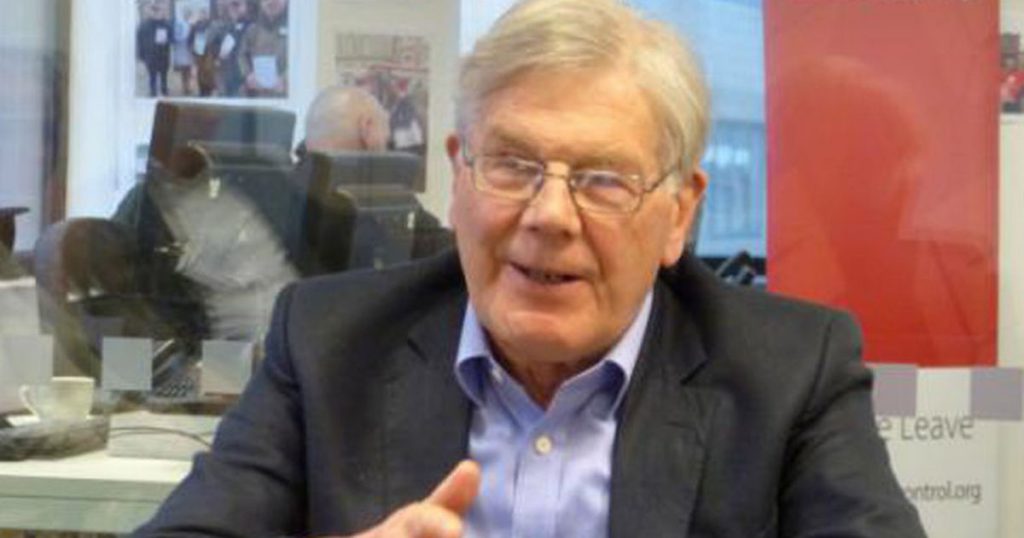Eddie Barnes | Twitter
Eddie Barnes is Campaign Director of Our Scottish Future.
SCOTLAND is awash with commentary on the dire state of devolution. For some, it is stuck in a rut. For others, its become a Scottish Westminster. Some unionists argue the whole enterprise should be written off as a flop. For some veteran devolution campaigners, the problems are enough to move them close to tears.
A fresh voice has just published his own analysis of where things are going awry. Two years after his untimely death in January 2020, Nigel Smith is finally having his say.
As was noted then, Smith was “the most influential political campaigner you’ve never heard of”. The chair of the cross party pro-devolution “Yes” campaign in the 1997 referendum, he preferred the shadows to the spotlight. But across a remarkable 50 year career in political campaigning, his influence was vast. He was involved to a greater or lesser extent in a plethora of campaigns – from anti-apartheid work in the 1960s, to efforts to strengthen BBC coverage in Scotland, to keep the pound, to exit the European Union, to oppose Scottish independence, and most of all to fight for a decentralised UK. Utterly non-tribal, always focused on policy, he was passionate about the UK and Scotland, believing that reform of both, and the devolution of power, could give those left behind on the margins a better chance in life. His energy, tenacity and wisdom was sought out by politicians and advisers in the SNP, the Conservatives, Labour and the Liberal Democrats. I wrote after he died that Smith lived out Harry Truman’s maxim – that “it is amazing what you can accomplish if you do not care who gets the credit” – to the very full.

Few people in Scotland are better qualified to give a rounded perspective on devolution’s progress than Smith. He was there at the beginning, knew all the key players, and thought deeply about the challenges. Thankfully, before he died, he wrote down his analysis. It was never made public. But this month, his family have published his views in a small pamphlet, entitled “The Scottish Parliament – Partial Success: could do better?” In the foreword, two of his friends and admirers, John McCormick (the former controller of BBC Scotland) and David Hutchison (the Honorary Professor of Media Policy at Glasgow Caledonian University) write: “As two of his friends who shared his desire to see devolution working for the betterment of our fellow citizens, we felt that this analysis, which is both systemic and trenchant, should be in the public realm. Nigel’s family happily agree and have made publication possible.”
Indeed it should. The analysis has barely aged a day and remains pertinent and relevant. It is damning of devolution’s mis-steps and errors. But it does not give in to point-scoring or score-settling. Instead, it sets out a series of reforms which, if undertaken, restore the “new politics” Smith championed. The analysis does not fit into a neat category – progressive, conservative, Unionist, Nationalist. In other words, it represents the thinking of a man who came at politics from first principles – specifically the desire to make life a little better for people. “I am not an ideologue about devolution”, Smith writes in the introduction. “Constitutional changes are embarked upon because we believe they make life better for people. If they don’t, we need to be honest about the shortcomings.”
He continues: “The Scottish Parliament has been only a partial success, certainly less successful than campaigners hoped for at the onset in 1997. It can do better.”
“WE BLEW THE OPPORTINITY”
Smith’s account begins in the mid-1990s when the movement for the Scottish Parliament was pressing ahead. In 1995, the Scottish Constitutional Convention published the blueprint for devolution, setting out the structure of a new parliament. After the 1997 vote in favour of a parliament, the then Scottish Secretary Donald Dewar set up a Consultative Steering Group for the Scottish Parliament which sought to set out a new culture for the place, one that was “closer to the Scottish people and more in tune with Scottish needs.”
It concluded: “People in Scotland have high hopes for their Parliament, and in developing our proposals we have been keen to ensure that these hopes will be met. In particular our recommendations envisage an open, accessible Parliament; a Parliament where power is shared with the people; where people are encouraged to participate in the policy making process which affects all our lives; an accountable, visible Parliament; and a Parliament which promotes equal opportunities for all.”
Smith writes in his pamphlet about the high hopes he and other devolution campaigners had for this “new politics”. He envisaged a parliament built around “consensus politics”. For some, the phrase will bring snorts of contempt, and the deadening whiff of compromise and back-room deals. In the memoir, Smith quotes a letter he wrote in 2001 to MSPs to explain what he meant. As I’ve found often, Nigel had a gift for presenting ideas to you afresh, of casting fresh light on what you thought you knew.
“Consensus – at its best, is a way of moving a radical idea from the fringes of opinion into the mainstream without losing its force. Compromise does exactly the opposite, cutting off all the bits that are radical. So consensus and compromise are polar opposites not, as many people think, versions of each other. Building a consensus takes time because people have to be won over by good argument and points have to be conceded. And because it takes time, it sits ill at ease with a political culture that needs an initiative every day and insists on absolute party discipline over all policy.”
Smith hoped the Scottish Parliament could stand against this culture and instead be a crucible for radical, patient, impassioned debate. He envisioned MSPs proposing reforming ideas on matters such as Scotland’s failing enterprise network, then seeking allies, confronting opponents, and trying to win majorities for their ideas. He hoped that, through argument and exposure, the parliament would smash down obstacles to reform. This is what he meant by the “new politics”: not a retreat to the lowest common denominator, but a politics in which free-thinking parliamentarians would argue their corner, win arguments, or concede to better ideas, and, having done so, challenge vested interests that block progress and change. This, as he saw it, was the benefit of a devolved parliament that would have room to put the big questions facing Scotland front and centre.
It did not happen. “Adversarial” Westminster-style politics, in which party lines dominate, kicked in instead. This all then “intensified” in the run up to the 2014 referendum and its aftermath. He writes here of how his hopes never got off the ground.
It went wrong even before parliamentarians met, Smith argues. He aims much his fire at the old Scottish Labour party, then the dominant force in Scottish politics (this was, younger readers may wish to know, some time ago). Echoing (or rather, preceding) recent comments by the former First Minister Jack McConnell, Smith writes of a culture gap within Scottish Labour at that time between those who saw the new parliament as “a grander version of Strathclyde Regional Council” and those who envisioned a “fuller, more free standing parliament.”
The old culture won out. Smith recalls how he was asked to be involved in the selection process for its first MSPs. He writes: “I was not prepared for how London-centric the process was. It was basically not devolved….there was a great emphasis on loyalty; too little on what a Labour-led new parliament could do. No job spec beyond loyalty and no general recruitment strategy.”
Of those elected, he notes 41% has local authority backgrounds as Labour councillors and 20% came from trade unions. Many were good and capable people, he acknowledges, citing MSPs such as Johann Lamont and Ken Macintosh. But “taken together it meant that 2/3 of the Labour group had prior experience which placed higher value on loyalty and solidarity”.
Despite ushering in the new parliament and his many strengths, Donald Dewar, he adds, had little interest in the “new politics” once the business of power had to be managed. For example, Smith recalls the parliamentary occasion when, not long after the parliament was formed, Henry McLeish set out the principles behind the Constitutional Steering Group. Smith was sitting in the parliamentary gallery.
“To my astonishment, as Henry McLeish rose to present his report, Donald Dewar, the First Minister, strolled out of the chamber. When he returned some time later, with McLeish still speaking, Dewar lingered at the back of the chamber talking to another member. Imagine a Prime Minister leaving the Commons as his chancellor rose to present the budget and the signal that would send.”
The Presiding Officer, David Steel, gave Dewar too much slack. Add to this, Smith writes, Dewar’s chief whip Tom McCabe made sure that government MSPs were aware of their prime loyalty – to their party. The consequence was that “the CSG’s consensual working recommendations had sunk in a Bermuda triangle surrounded by an over-worked and on this issue uninterested First Minister, a hesitant Presiding Officer and a disciplinarian Chief Whip”.
He concludes: “With hindsight, we in the CSG were too focussed on the dangers of importing the worst practices of Westminster when we should have been more alive to importing the worst practices of (mainly Labour) local government into the ‘new politics’”. And so the parliament set out on the wrong track. There was, he reflects, “no golden age….the first parliament was a unique opportunity. Looking back – and to be blunt – we blew the opportunity.”
For such a committed devolutionist, it was painful. As the parliament ground on, he watched as Scotland’s conservative establishment closed in over it. He became filled with “insider pessimism”. In the pamphlet, he publishes a piece of private correspondence with a friend who had argued that the Scottish political village had become “vibrant”.
“You call it village Scotland vibrant while I think it is moribund. It is the dinner table leadership of Scotland, a place for insiders and the institutions of the managed society to exchange their inertias. Some of us were naïve enough to think we were opening all this up to a blast of fresh air….Do you really think the CBI or Scottish Enterprise are one whit different since devolution? Apart from laying a few more places at the dinner table for MSPs, all goes on as before. While doing things in a stylish new way, I have this nagging sense that underneath we are still too close to the old system with too many people supporting it and too few challenging it.”
A further mistake, Smith notes, was over the failure of the British state – from Ministers to civil servants – to understand that, in setting up the new parliament they also needed to embrace reform in the way the entire UK operated too. He quotes a letter he published as far back as 1998, prior to the parliament’s first sitting, where he urged the new Labour government to “take full account of reform” in Scotland and Wales. This, he argued, will “strengthen Britain”. In the pamphlet, he concludes: “The British state created devolution north of the border and then rolled on as before as if nothing significant had happened. Twenty years later, there is still no reform at the centre of Britain. In the intervening years, the UK has poured more powers into the Scottish ‘enclave’ and now wonders why it behaves like a quasi-sovereign state.”
“The failure to give British coherence to devolution was the great omission of 1998,” he writes.
In short, no British context for devolutionary reform, errors by the ruling Labour party at the outset, and disinterest in the idea of a “new politics” deadened the parliament’s promise from the outset.
A FAILURE TO DELIVER
Now, twenty years on, the parliament is locked in post-referendum division. Does Smith believe it could be classed a success or a failure? On the plus side, he notes the parliament has done plenty. On what he describes as “tier two” issues – from marine conservation to mental health to rail franchising – the parliament has succeeded in pushing through legislation that would otherwise have fallen by the wayside. But on “tier one” matters – health, social justice, education, the economy – he is less kind. On the economy, and speaking as an industrialist himself, he writes: “I can state categorically that the existence of the Scottish Parliament has made matters absolutely worse”.
On education, he laments:
“None of the campaigners in 1997, Salmond, Dewar or (Jim) Wallace (the former LibDem leader) or we lesser fry, not one of us, remotely contemplated the possibility that the Scottish Parliament would preside over a relatively worse education for the generation of children born in 1997 and since. We were dedicated to the idea that the Scottish Parliament could do better for the 600,000 children in our schools – and it hasn’t.”
He adds that MSPs are simply “not demanding sufficient quality in legislation of policy, are too easily brought to heel by strong government operating in a structure that favours control, or are too easily neutralised by tribal loyalties.”
The Parliament has abided by “a rather conservative middle class social democracy, a strong inbuilt bias to the less risky status quo”. He notes that, for the current SNP Government, “not emulating Westminster seems more important than finding the best options for Scotland.” And there is a political culture he describes as “too managed or self-censored.”
“I expected (the parliament) to break the binary pattern and usher in a new more diverse, tolerant public discourse. Instead Scottish governments, from the outset, simply utilised the big tent mono culture, adding as gatekeepers special advisers who would decide what is permissible and what ideas are beyond the pale. There is a risk in a small country that government is the one big player able to dominate and all else is sidelined. This is not healthy nor does it build the confidence needed to tackle the big issues well.”
REVIVING THE “NEW POLITICS”
It is not a bright picture. But as Smith acolytes know, Nigel always looked to the positives. With characteristic precision, detail and optimism, he sets out how the early ideals of devolution can still be rekindled. Parliamentarians, he argues, “are not demanding high enough standards of government”. But with reform, they could do so. The key is to rebalance the structure of the parliament.
Smith notes that, in 2016, the payroll vote in Holyrood (Ministers plus parliamentary liaison officers) made up fully 30% of members. In Westminster, the figure is 22%. In other words, proportionally, the government is far stronger in Holyrood than it is in the Commons. “The monitoring and scrutiny capacity of the Scottish Parliament fills a double decker bus – but with a tribe on each deck,” he notes. The solution is not to add to the number of MSPs. It is to slash the payroll vote.
The Scottish Government should be limited to 18 ministers, he writes. Parliamentary Liasion Officers should be cut to 9. That means more MSPs whose job is (nominally) to scrutinise.
Committees should also have fewer MSPs sitting on them, he argues, and members should elect convenors, not the governing party.
And, he suggests, new MSPs should receive formal training. “(It) should be independent of party, concentrating on members’ role as parliamentarians and founded on the idea that even the newest and youngest MSP is not there solely as a representative but has a role in keeping up the quality of government.”
The sadness, says Smith, is that far from being a “trailblazer” in offering a more robust, vigorous democracy, Holyrood has been eclipsed by Westminster. It, he notes, has “innovated with more assertive committees and more dissent from governing party members, leaving Holyrood the laggard, preserving by accident a part of the old Westminster adversarial system.”
His final recommendation is for the debate over ‘more powers’ to be put on hold. “Almost since the 1998 referendum and certainty for more than ten years, the consensus has been that Holyrood should acquire more powers….Now Brexit promises still more. But does it really make sense to add new powers, let alone sovereign powers, when there is such obvious failure to use existing powers for the benefit of the people?….would it not be better to halt the granting of new powers for a period of five years while parliament improves its performance?”
He adds: “For those absorbed by the constitutional debate, I reiterate…’more powers without UK reform’ is a policy with diminishing returns for unionists. More powers in isolation works fine for those whose ultimate destination is independence.”
Doubtless many anti-devolutionists, who see the creation of the Scottish Parliament as a fatal error that has allowed nationalism to take hold in Scotland, will take Smith’s withering verdict on Holyrood’s performance over its first twenty year as proof they were right all along. Smith’s final words in the pamphlet are directed at them.
“Many will see this paper as a recantation. It is nothing of the sort. To a decentralist, there is no reason why Scotland cannot have a strong and effective parliament within the UK. It has such a parliament – if it would only use it properly. I wish it well.”
The pamphlet is being circulated over the summer by his family and friends. It will be poured over politicians and devotees who used to rely on his counsel and advice. Two years after he died, Nigel Smith continues quietly to influence Scotland’s future.






